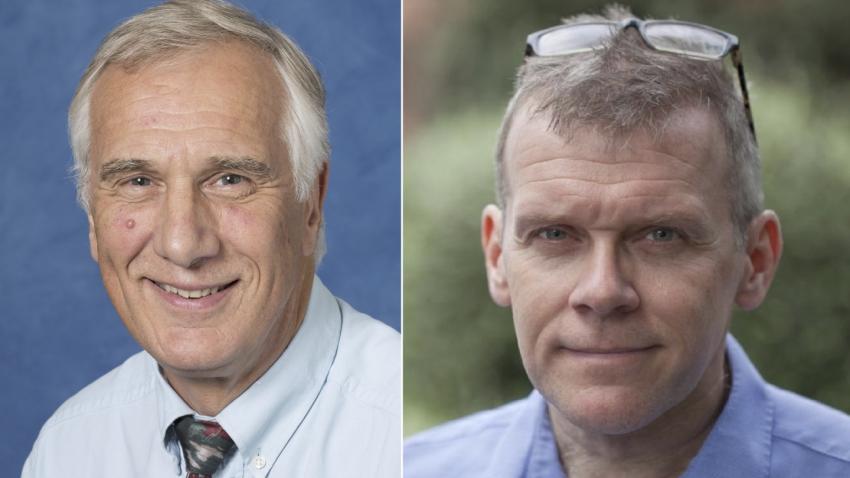A space physicist who studies the links between the Sun, the Earth and Mars has been elected as President-Elect of the Royal Astronomical Society (RAS).
Professor Jim Wild, of Lancaster University, will serve in the role for 12 months, before succeeding current President Mike Lockwood following the conclusion of the latter's two-year term in May 2026.
"I'm thrilled to have been appointed President-Elect," Professor Wild said. "The RAS is a unique and respected organisation, able to speak with expertise and authority.
"At a time when the UK research and higher education sectors are facing considerable challenges, the Society has a vital role to play in communicating the contribution of astronomy and geophysics to the UK's scientific and cultural landscape.
"I'm looking forward to the opportunity to engage with Council, the Society's staff and the Fellows over the coming years."
A passionate science communicator, Professor Wild has established himself as a popular speaker for public audiences, while also contributing to print and broadcast media. In 2018, his commitment to the communication of space and planetary research was recognised by the award of the RAS James Dungey Lectureship.
His research explores the physics of the natural space environment, as well as those behind the Northern Lights, the impact of space weather on human technology and the interaction between planetary magnetospheres and the interplanetary environment.
Professor Wild is a member of the UK's Space Environment Impacts Expert Group, an independent committee of space weather experts that provides support and advice to the UK Met Office and Government Departments. He also previously chaired the Science and Technology Facilities Council's Astronomy Grants Panel, between 2017-2019.
Outside of his field of expertise, Professor Wild is a keen fell runner and can often be found on the high fells of the Lake District.
In August 2024, he achieved a long-standing personal goal of completing the legendary 'Bob Graham Round', a 110km route starting and finishing in Keswick which takes in 42 summits and 8,000m of ascent, all to be completed in 24 hours.
Professor Wild's appointment was confirmed at the Society's Annual General Meeting on Friday 9 May 2025, along with the election of two new vice-presidents and four councillors.
The other council results are as follows, where 'A' covers all areas of astronomy and astrophysics, including exoplanets, and 'G' covers geophysics, solar, solar-terrestrial and planetary physics.
Professor Steve Miller, of University College London, has been elected as a vice president (G) and the University of Sheffield’s Professor Paul Crowther as a vice president (A). Both will serve a term of two years.
Four councillors, all serving for a term of three years, were also elected. They are:
Karen Anne Devoil (G), Dr Cyrielle Opitom (A), Dr Mike Peel (A) and Professor Andrew Curtis (G).
ENDS
Media contacts
Sam Tonkin
Royal Astronomical Society
Mob: +44 (0)7802 877 700
Dr Robert Massey
Royal Astronomical Society
Mob: +44 (0)7802 877 699
Images and captions
Caption: Professor Jim Wild, of Lancaster University, has been elected as President-Elect of the Royal Astronomical Society.
Credit: Joe Mather Photography
Caption: In his spare time Professor Wild is a keen fell runner and can often be found on the high fells of the Lake District.
Credit: Supplied
Caption: Professor Steve Miller, of University College London, has been elected as a vice president (G).
Credit: UCL
Caption: Professor Paul Crowther, of the University of Sheffield, was elected as a vice president (A).
Credit: University of Sheffield
Notes for editors
About the Royal Astronomical Society
The Royal Astronomical Society (RAS), founded in 1820, encourages and promotes the study of astronomy, solar-system science, geophysics and closely related branches of science.
The RAS organises scientific meetings, publishes international research and review journals, recognises outstanding achievements by the award of medals and prizes, maintains an extensive library, supports education through grants and outreach activities and represents UK astronomy nationally and internationally. Its more than 4,000 members (Fellows), a third based overseas, include scientific researchers in universities, observatories and laboratories as well as historians of astronomy and others.
The RAS accepts papers for its journals based on the principle of peer review, in which fellow experts on the editorial boards accept the paper as worth considering. The Society issues press releases based on a similar principle, but the organisations and scientists concerned have overall responsibility for their content.
Keep up with the RAS on Instagram, Bluesky, LinkedIn, Facebook and YouTube.
Download the RAS Supermassive podcast



